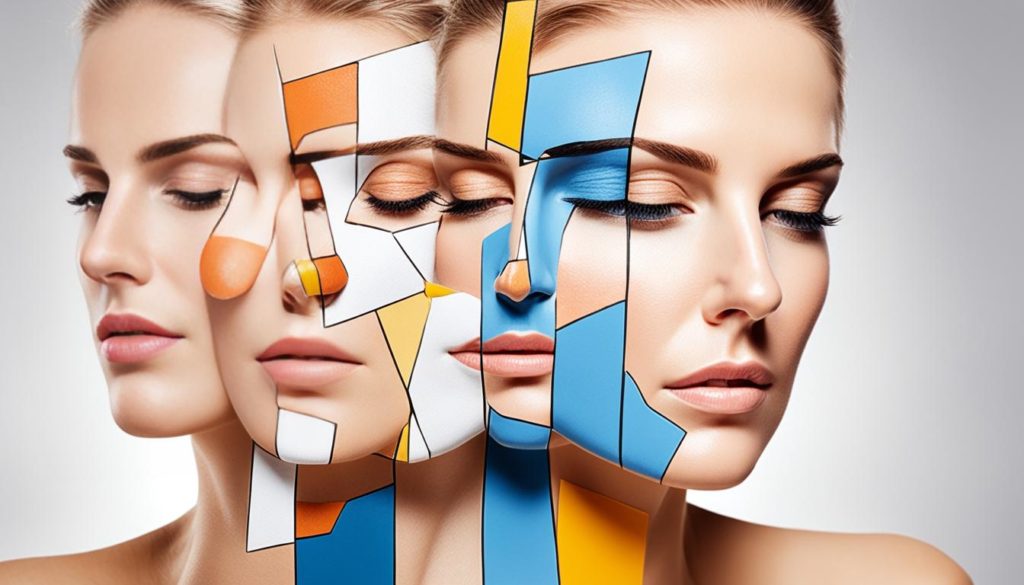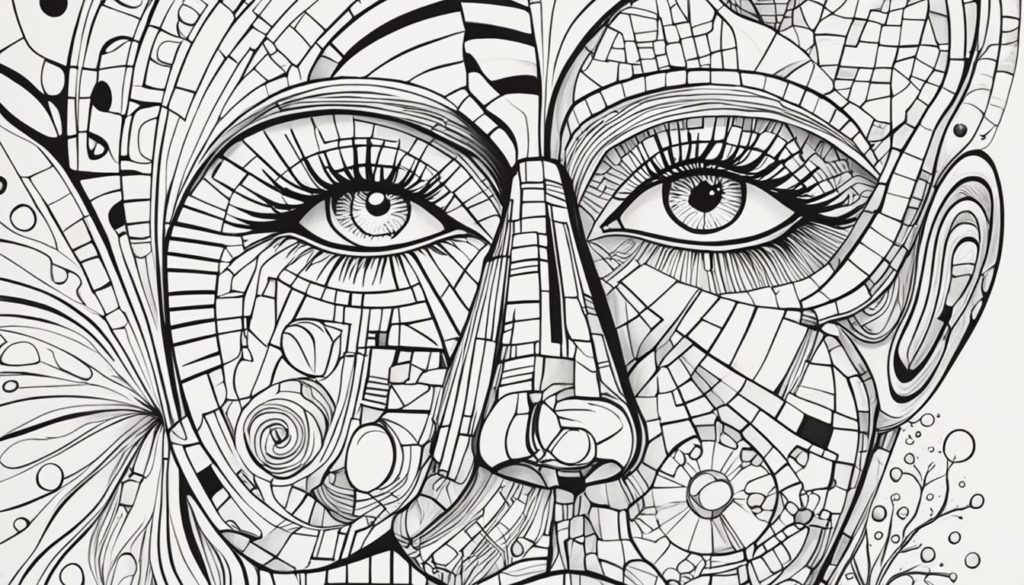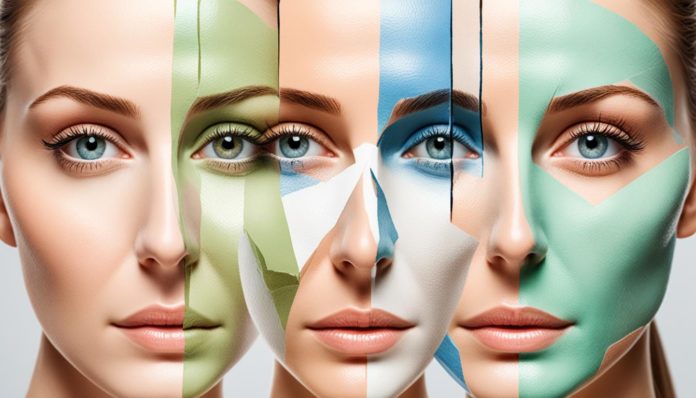Did you know that a huge 85% of people aged 12 to 24 face some acne? Hormones were always blamed before, but now we see stress as a big factor. In today’s world, stress is something we all feel. It doesn’t just affect our minds; it can also make our skin worse. This guide will explain how stress plays a role in acne and offer ways to handle stress for better skin.
Key Takeaways
- Stress can directly influence the severity and frequency of acne breakouts.
- Understanding the role of cortisol is essential in recognizing how stress worsens acne.
- Biological mechanisms, like inflammatory responses and sebum production, play a crucial role.
- Identifying and diagnosing stress-related acne can help in tailoring effective treatments.
- Adopting a holistic approach, including lifestyle changes and proper skincare routines, is key to managing stress for clearer skin.
The Connection Between Stress and Acne
Stress and acne are closely related through complex ways. At the center, the stress hormone cortisol triggers skin problems. Knowing the impact of cortisol on acne helps understand how to tackle stress-related skin issues.
Understanding the Stress Hormone: Cortisol
Our bodies release cortisol, known as the “stress hormone,” during stressful moments. This hormone is made in the adrenal glands. Its main job is to help us handle stress better. But, high levels of cortisol can harm the skin, causing different skin problems.

How Cortisol Triggers Acne
Cortisol leads to more oil production in the skin, resulting in acne. This happens because it makes the oil glands work overtime. Too much oil can block pores, and this causes inflammation and acne. Cortisol also messes with other hormones which can make acne worse.
Psychological Effects on Skin Health
The mind’s impact on skin health is also big. Stress might lead to not eating right, sleeping less, and touching your skin too much, making acne worse. It’s important to look after both your mind and body to manage acne well. Knowing how your feelings affect your skin is key in finding the best way to treat acne.
- Cortisol Production: Elevated by stress.
- Increased Sebum: Leads to clogged pores.
- Inflammation: Aggravates acne development.
| Factors | Description |
|---|---|
| Stress Hormone Cortisol | Triggers sebum production and hormone imbalance |
| Psychological Effects on Skin | Lead to poor skincare habits and increased acne |
Biological Mechanisms: How Stress Impacts Skin
Stress affects the skin in complex ways, involving many body processes. Knowing how this happens helps us understand stress-related acne problems better.
Inflammatory Responses
Stress can make the body’s inflammation worse. This is not good for the skin. For example, chronic stress can make the immune system inflame our skin. This can make acne problems get worse because it helps acne bacteria grow.

Studies show that stress can make acne more red and swollen. This happens because our bodies try to fight stress but end up harming our skin.
Impact on Sebum Production
Stress changes how much sebum our skin makes. Sebum is an oily stuff that keeps our skin moist and safe. But stress can make our bodies produce too much sebum due to changes in hormones like cortisol.
Too much sebum can block pores and make acne worse. Research suggests that less stress can keep sebum levels normal and reduce acne.
Understanding stress’s effects—like inflammation and sebum production—helps us tackle skin problems better. It’s crucial for managing stress and improving our skin’s health.
Common Stress-Related Acne Symptoms
Recognizing signs of stress-related acne can really help. It aids in early detection and tells it apart from other acne types.
Identification and Diagnosis
Doctors have special ways to tell if acne is due to stress. They look at when acne shows up and its pattern.
- Localized Breakouts: Stress acne often shows up in areas like the face, neck, and back.
- Redness and Inflammation: A big sign of common stress acne symptoms is more redness and swelling.
- Persistent Recurrence: Stress acne comes back more during stressful times unlike other acne types.
- Painful Lesions: These spots are more painful and swollen, causing discomfort.
Dermatologists look at several factors and your stress levels to diagnose stress acne. Getting it right is key for an effective treatment plan.
| Symptom | Description |
|---|---|
| Localized Breakouts | Shows up mainly in places like the face, neck, and back |
| Redness and Inflammation | More redness and swelling around the acne spots |
| Persistent Recurrence | Keeps coming back when stressed |
| Painful Lesions | Spots that hurt and make you uncomfortable |
Lifestyle Factors that Exacerbate Stress Acne
Our daily choices play a big role in the health of our skin, especially when it comes to acne caused by stress. Knowing how eating and sleeping habits impact our skin can help us control these outbreaks better.
Diet and Stress
The link between diet and acne is clear. Eating lots of sugary and fatty foods can make inflammation worse. This can lead to more stress and more acne. Eating healthy foods like fruits, vegetables, and whole grains can help lower stress levels.
Foods rich in omega-3 fatty acids, such as salmon and flaxseed, can reduce inflammation. On the other hand, foods high in sugar, like sweets and sugary drinks, can make stress acne worse.
Sleep Patterns and Skin Health
There’s a strong connection between sleep and skin health. Bad sleep can increase stress, upset hormonal balance, and make the skin more likely to get acne. Good sleep helps our skin heal and lowers stress hormones like cortisol. This can make it easier to deal with acne.
It helps to sleep enough and have a bedtime routine. Creating a peaceful place to sleep is also important for keeping your skin healthy.
Tips for Managing Stress to Reduce Acne
Managing stress is key to fighting acne. Strategies like mindfulness, meditation, exercise, and good food help improve skin health.
Mindfulness and Meditation Techniques
Using mindfulness for skin health means doing meditation and breathing deep. These calm your mind and control stress. This leads to better mental health and less acne.
Regular Exercise Benefits
Exercise benefits on acne are huge. Physical activity lowers stress hormones, raises happy hormones, and improves blood flow. This not only cuts stress but also boosts skin health, making acne less.
Healthy Eating Habits
Eating right is great for stress and acne. A diet full of antioxidants, vitamins, and minerals helps. Include leafy greens, nuts, and berries for skin-friendly benefits.
Skincare Routines for Stress-Induced Breakouts
A special skincare routine can help fight stress-related acne. It tackles breakouts and eases stress that harms your skin. Here are key tips, including products and expert treatments, for better skin.
Recommended Products
Finding the right products is essential to manage stress acne. Look for key ingredients such as salicylic acid, benzoyl peroxide, and niacinamide. They target acne and lower inflammation. Here are some top picks:
- Cleanser: Neutrogena Oil-Free Acne Wash
- Toner: Thayers Witch Hazel Toner
- Serum: The Ordinary Niacinamide 10% + Zinc 1%
- Moisturizer: CeraVe Daily Moisturizing Lotion
- Spot Treatment: La Roche-Posay Effaclar Duo
Daily Skincare Practices
Being consistent and gentle with your skin is crucial. Stick to these steps for better skin:
- Cleanse twice daily with a gentle cleanser to remove impurities.
- Apply a toner to balance the skin’s pH levels.
- Use a serum that targets stress acne, focusing on problem areas.
- Moisturize to keep the skin hydrated and prevent dryness.
- Apply sunscreen every morning to protect against UV damage.
- Weekly: Use a soothing face mask like the Origins Clear Improvement Charcoal Mask to purify skin.
Professional Treatments
If your stress acne is stubborn, consider seeing a dermatologist. They can recommend treatments that work faster and more effectively. Here are some options:
| Treatment | Description | Benefits |
|---|---|---|
| Chemical Peels | Exfoliates the skin with a chemical solution | Reduces acne, scars, and improves skin texture |
| Laser Therapy | Uses light to target acne-causing bacteria | Decreases inflammation and acne severity |
| Microdermabrasion | Non-invasive procedure to exfoliate and renew skin | Improves complexion and reduces acne scars |
Adding these steps to your daily routine can really cut down on breakouts. Use the right products, be consistent in your skincare, and consider expert treatments for clear, healthy skin.
How Stress Affects Acne: Case Studies and Real-Life Examples
Learning about the connection between stress and acne is helpful for many. Through real-life stress acne examples, we see how stress makes acne worse. We also learn about ways to deal with it and treatments that can help.
Personal Testimonials
Dr. Eva Selhub’s study includes real-life stress acne examples. One example is a college student. She saw her acne get worse during finals but found help through doctors and mental health care. Another story is about Melissa, a busy executive. She saw her skin get better after adding yoga and mindfulness to her daily life.
These personal stories highlight how stress impacts our skin. Many have improved by changing their habits and getting help. These stories can motivate others who are dealing with similar problems.
Success Stories
There are many inspiring stories of overcoming acne by tackling both mental and physical health. For example, David, a high school teacher, dealt with his stress-related acne. He changed his diet, took good care of his skin, and practiced stress-reducing activities like meditation.
These victories show we need a combined effort to fight stress-related acne. Working together with skin doctors and mental health experts is key. This article shares more about these full approaches.
Though everyone’s experience is different, one common idea stands out. Managing stress well is crucial for clear, healthy skin.
Expert Opinions on Acne and Stress Relationship
Understanding the acne and stress relationship is a team effort. It needs insight from dermatologists and mental health experts. Together, they shed light on this complicated topic.
Dermatologists’ Insights
Top skin doctors link stress to worse acne. They say stress hormones, like cortisol, make the skin oily. This leads to blocked pores and inflammation.
Dr. Howard Murad points out stress’s big role in skin health. “Managing stress helps keep skin clear,” he says. He explains stress boosts cortisol, making acne worse.
Mental Health Professionals’ Views
Mental health experts focus on how stress affects the mind and skin. They suggest therapy and mindfulness to tackle stress. This, in turn, helps reduce acne.
Dr. Aaron Beck, who created CBT, believes treating stress is key. He says getting to the root of stress can make skin healthier.
| Expert | Field | Key Insights |
|---|---|---|
| Dr. Howard Murad | Dermatologist | Stress increases cortisol, exacerbating acne |
| Dr. Aaron Beck | Mental Health Professional | CBT can reduce stress, improving skin health |
Preventive Measures for Stress-Related Acne
Preventive care for stress acne begins by spotting and making lifestyle changes to lower stress. Using stress-lowering techniques regularly can help stop acne before it starts. This way, your skin stays healthier.
- Mindfulness Activities: Yoga, meditation, and deep-breathing exercises are great ways to stay calm. These practices help keep stress acne at bay by keeping the mind peaceful.
- Regular Physical Exercise: Regular workouts lower stress and are good for the skin. They release endorphins, which naturally cut down stress.
- Balanced Diet: Eating foods full of antioxidants and vitamins is key. A good diet keeps the skin healthy and fights stress acne. Foods like salmon and walnuts are good because they lower inflammation.
- Adequate Sleep: Try to get 7-9 hours of sleep without waking up. Sleeping well helps fight stress acne by letting the body heal and keeping hormones in check.
Focusing on skincare tailored to you is also key in fighting stress acne. This includes:
- Gentle Cleansing: A soft, non-comedogenic cleaner removes dirt but keeps your skin’s essential oils.
- Hydration: Keeping your skin moist is important. It helps keep the skin’s barrier strong, protecting it from stress.
- Avoiding Harsh Products: Stay away from alcohol-based products or ones with harsh chemicals. They can make acne worse.
Mixing these steps into your daily life helps you manage stress better. This keeps your skin clear and healthy.
| Preventive Measure | Description |
|---|---|
| Mindfulness Activities | Yoga, meditation, and deep-breathing exercises to reduce stress. |
| Regular Physical Exercise | Engages in activities that release endorphins to lower stress. |
| Balanced Diet | Includes foods rich in antioxidants and omega-3 fatty acids. |
| Adequate Sleep | 7-9 hours of uninterrupted sleep each night. |
| Gentle Cleansing | Use of mild, non-comedogenic cleansers to maintain skin balance. |
| Hydration | Ensuring skin stays well-hydrated to support its natural barrier. |
| Avoiding Harsh Products | Use of products free from alcohol and harmful chemicals. |
Conclusion
It’s clear that stress greatly affects skin health. It can break down the skin’s barrier and make more sebum. This all leads to worse acne. Research on stress and acne shows that controlling stress is crucial for good skin care.
To manage stress and improve skin, a whole life approach is needed. This includes stress methods, life changes, and skin care. Using mindfulness, exercising, and eating well helps lower stress. This can make acne better. And, a skincare routine for stress breakouts helps even more.
Learning more and working with doctors is key for the best skin care plan. By using these full skin health steps, people can handle stress and acne better. This leads to clearer and healthier skin.
FAQ
How does stress affect acne?
Stress increases cortisol, a hormone that can make acne worse. It also can make existing skin issues more severe by affecting other hormones.
What is the connection between stress and acne?
Stress and acne are linked mainly through cortisol. This hormone can make the skin oily, leading to acne. Stress also harms the skin’s outer layer, making it prone to acne.
How does cortisol trigger acne?
Cortisol boosts sebum production, clogging pores and causing acne. It also causes inflammation, making acne and other skin issues worse.
What are the psychological effects on skin health related to stress?
Stress can lead to harmful habits like skin picking. It lowers the skin’s healing ability and weakens its protective layer, increasing breakout risks.
What are the common symptoms of stress-related acne?
Stress-related acne features more pimples, redness, and inflamed spots, especially where oil glands are dense. This includes the face, chest, and back.
How can I identify and diagnose stress-related acne?
Notice if more acne pops up during stressful times. A dermatologist can spot stress acne by looking at your stress levels and where breakouts happen.
Which lifestyle factors can exacerbate stress acne?
Poor eating habits, bad sleep, and not exercising can worsen stress acne. These habits boost stress, contributing to breakouts.
How does diet impact acne related to stress?
Eating lots of sugar and carbs can raise insulin, spiking cortisol and acne. A bad diet also leads to inflammation, causing more acne.
In what ways do sleep patterns affect skin health?
Poor sleep raises cortisol, making skin oilier and less able to heal. This can lead to more acne and hurt skin health.
What are some tips for managing stress to reduce acne?
To fight acne, try stress-reducing steps like mindfulness, exercise, and eating well. These can lower cortisol and boost skin health.
What types of skincare routines are recommended for managing stress-induced breakouts?
Use gentle cleansers and non-comedogenic products for stress acne. Adding niacinamide and green tea extract can also help. Stay consistent for best results.
Can professional treatments help with stress-related acne?
Yes, seeing a dermatologist for treatments like peels or lasers can aid. Combining these with stress management can greatly improve your skin.
How do experts view the relationship between acne and stress?
Doctors see cortisol as a key link between stress and acne. Mental health strategies to manage stress are also vital. Together, they offer a complete treatment approach.


